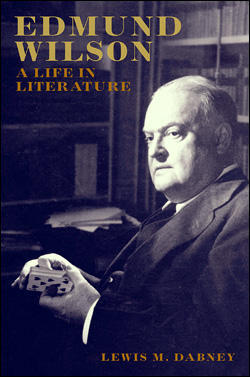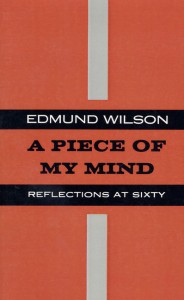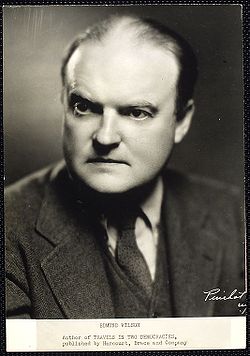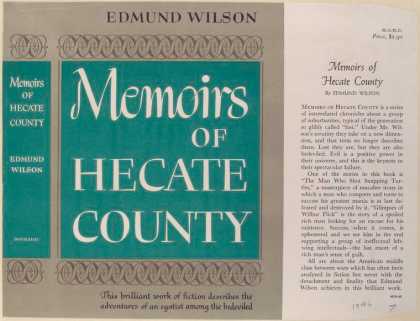Book Review: Edmund Wilson — Prophet of the Blogosphere, Part 2
By Bill Marx
Edmund Wilson: A Life in Literature (Paperback) By Lewis M. Dabney. Johns Hopkins University Press, 672 pages, $25.
Literary Essays and Reviews of the 1920s & 30s (Library of America #176) By Edmund Wilson. Edited by Lewis M. Dabney. 1026 pages, $40.
Literary Essays and Reviews of the 1930s & 40s (Library of America #177) By Edmund Wilson. Edited by Lewis M. Dabney, 1000 pages, $40.
Edmund Wilson’s Marxism, though leavened with a saving skepticism, could also push his evaluation of literature into a blind lockstep. For him, Willa Cather’s novels of the ‘20s, such as The Professor’s House, were not sufficiently aware of the effects of adverse social conditions to be of merit. “Yet in criticism,” writes critic Terry Castle, “as in tennis, lordliness is requisite.”
Wilson playing the role of august paleface isn’t the first or last critic to base at least some of his intellectual authority on rising above the fray by keeping the artistic riffraff in order with abstract blueprints in hand. The problem is that his favored instruments, Freudianism and Marxism, sometimes shoved the more incisive aspects of his sensibility aside.
Wilson had his mandarin dreams, but they were tempered by redskin appetites. Wilson was part of a vital American generation of intellectuals that included Mencken, Walter Lippmann, Paul Rosenfeld, and Van Wyck Brooks, and which, according to author Stephen Biel in his worthy book Independent Intellectuals in the United States, 1910-1945, practiced “a faith in the ultimate inspiring form of criticism that rejected binding political and institutional affiliations and thus seemed conducive to intellectual independence.”
The lordly yes, by all means, and the Freudian if possible, but also, because of the yearning for intellectual independence, the down-and-dirty as well. So we get not only the icy sexual hijinks recorded in his decades of Journals, the pieces on film and vaudeville, but also his coverage of striking coal miners in 1932’s The American Jitters, concern with the battle for Indian land rights in 1960’s Apologies to the Iroquois and in his 1968 essay “The Fruits of the MLA,” a defense of literature against academic obfuscation British that admirer Clive James called “the most important academic act of the postwar years.”
Wishing to chronicle American experience through fresh eyes, Wilson and other critics in his generation saw themselves as reporters as well as commentators: they assumed that popular criticism had to be passionate about its social as well as cultural responsibilities. To them it was more imperative to keep abreast of American reality, with an eye on encouraging change, than to absorb the latest critical fashions. “All our activity, in whatever field it takes place, is an attempt to give meaning to our experience,” wrote Wilson, “that is, to make life more practicable.” Ideally, the critic would be a professional dissenter — it is difficult to see many critics making that assertion today.
Like Mencken, Wilson represents the feistiest of American intellectual exemplars — the critic as builder-up and tearer-down, as upholder of standards, as iconoclast. In his final comment on Mencken, Wilson hailed him as “a poet in prose and a humorist, and in his time, in certain departments, a bringer of light to ‘the Republic.’”
 Dabney argues that Wilson continues to have an impact on American letters, bringing light to the contemporary literary scene by way of his “clarity and concreteness, his imposition of a dramatic narrative on the world, his capacity for detached judgment.” Wilson’s verdicts when he served as a book reviewer for The New Republic, The New Yorker, and other high profile magazines carried considerable weight among serious culture vultures. His lifelong allegiance to independent thought was an inspiration to other critics, including Alfred Kazin and Irving Howe. Howe wrote about Wilson that “almost everybody looked up to him. Writers and critics looked up to him, both those for whom he served as a mentor and those ambitious enough to have him as a model… His career took on a heroic shape, the curve of a writer who attains magisterial lucidity in middle age and then in the years of decline struggles ferociously to keep his powers. One doesn’t customarily think of writers as heroes; nor are heroes always likable. But in Wilson’s determination to live out the idea of the man of letters, in his glowing eagerness before the literatures of mankind, and in his stubborn insistence on speaking his own mind, there is a trace of the heroic.”
Dabney argues that Wilson continues to have an impact on American letters, bringing light to the contemporary literary scene by way of his “clarity and concreteness, his imposition of a dramatic narrative on the world, his capacity for detached judgment.” Wilson’s verdicts when he served as a book reviewer for The New Republic, The New Yorker, and other high profile magazines carried considerable weight among serious culture vultures. His lifelong allegiance to independent thought was an inspiration to other critics, including Alfred Kazin and Irving Howe. Howe wrote about Wilson that “almost everybody looked up to him. Writers and critics looked up to him, both those for whom he served as a mentor and those ambitious enough to have him as a model… His career took on a heroic shape, the curve of a writer who attains magisterial lucidity in middle age and then in the years of decline struggles ferociously to keep his powers. One doesn’t customarily think of writers as heroes; nor are heroes always likable. But in Wilson’s determination to live out the idea of the man of letters, in his glowing eagerness before the literatures of mankind, and in his stubborn insistence on speaking his own mind, there is a trace of the heroic.”
Even so, Dabney’s contention that, throughout his career, Wilson was central to American culture is problematic. Few of his books sold in large numbers when they were initially published, aside from the risqué Memoirs of Hecate County. And during the final decades of his life Wilson’s writings had less and less to do with evaluating the new and challenging in contemporary culture. After his death, Wilson’s belief that criticism could offer a “dramatic narrative,” shaped by a disinterested evaluator/historian to appeal to the common reader, was deemed anachronistic in a critical world awash in jargon-ridden theory and close readings. Unlike deconstuction and New Criticism, Wilson’s ultra-educated, ornery sensibility was difficult to teach in the classroom, let alone duplicate in newspapers or magazines.
Howe is right that Wilson’s heroism is a model for critics and writers today, but the reasons for this have shifted because of substantial changes in the state of journalistic criticism since his death. From the start, Wilson positioned himself as both an insider and an outsider in the reviewing establishment. He scolded journalistic critics, most memorably in his 1928 essay “The Critic Who Does Not Exist,” which condemned problems that are still pervasive — logrolling, provincialism, and a thumbs-up, thumbs-down mentality. In the ’20s and ’30s book critics exerted real power as tastemakers: huge book clubs and fat newspaper literary supplements starred reviewers whose gushing edicts were followed by readers anxious to be in the cultural know. Wilson had no objection to reviewers as mandarins — he simply demanded they be more independent, cast a wider intellectual net, and meet higher ethical standards.
Book reviewers and the wider culture had a parting of the ways after World War II (with a brief reconnection thanks to the counterculture in the ’60s), prompted by mass entertainment, especially the popularity of movies and the embrace of narrow interpretive methods in English departments. Over the past three decades, as coverage of literature in the mass media has been pushed into the margins, journalistic book critics have lost their cachet. There are no longer enough column inches, editorial will, or public interest to create literary poobahs — Oprah Winfrey is about as close to an old-fashioned kingmaker as the publishing industry is going to get.
Yet during the past decade opinionated writing about literature has grown over the Internet, from online ’zines to the ever-expanding blogosphere, where criticism takes various forms, from the sedate to the sensational. And this transformation in the cultural conversation makes Wilson’s expansive approach to his conception of the critic look prophetic. From his tell-all journals to his headstrong urge to write, along with criticism, cultural reporting, revisionist history, and social commentary, no other no other American critic in the 20th-century looks as congenial to 21st-century blogging than Edmund Wilson. Like any worthwhile blogger, he is nothing if not intensely personal. Dabney reports Isaiah Berlin’s admiring belief that his friend Wilson brought “his whole self to every word he wrote.”
I think that the Wilsons of the future will find the blogsphere a natural home, though I agree with Charles McGrath’s contention in a New York Times review of the Wilson Library of America volumes that the critic “would have been deeply troubled by the prevailing assumption that most work on blogs is done for free.” Wilson would have wanted to be paid, no doubt about it. But, given his sardonic feelings about academics, the man of letters would have approached reviews “written by and for people who in many cases are literary hobbyists,” as McGrath patronizingly (and defensively) dubs book bloggers, with open-minded sympathy.
 As the traditional center of the literary culture melts down in the medium of print, online outlaws will be experimenting with ways to discuss literature — its ideas, its pleasures, its traditions. And that makes the example of Wilson’s “stubborn insistence,” his scrappy eye on the past and the present, indispensable. His best work personifies the virtues of disinterested evaluation, independent thought, and deep respect for learning, but he was also dedicated to searching and fighting for artistic value in the cultural margins.
As the traditional center of the literary culture melts down in the medium of print, online outlaws will be experimenting with ways to discuss literature — its ideas, its pleasures, its traditions. And that makes the example of Wilson’s “stubborn insistence,” his scrappy eye on the past and the present, indispensable. His best work personifies the virtues of disinterested evaluation, independent thought, and deep respect for learning, but he was also dedicated to searching and fighting for artistic value in the cultural margins.
The Internet is a exciting way to bring attention to, as well as converse with, neglected writers from around the world. Dabney writes that Wilson “once confessed that he was never happier than when telling people about a work they were unfamiliar with in a language they didn’t know.” The writer’s infamous polyglot curiosity remains inspiring at a time when reviews of works in translation in newspapers and magazines are scarce, despite proclamations about the trendiness of world literature.
What’s more, Wilson also perceived, much in the spirit of the best online writing, that cultural commentary must be part of an wider debate, an exchange of views that should permeate society if it is to remain healthy. He encouraged others to become part of an inclusive critical conversation that addressed wide-ranging issues of value and purpose. For instance, when Auden came to America, Wilson advised the poet how to “not be paralyzed or bought by… the whole English-speaking-industrial-ugly-democratic-leveling-oppressive, urban and suburban world.” Auden was told to steer clear of the insular literary establishment and join hands with serious artists and individuals “functioning in the crevices of cities, in the faculties of provincial colleges or scattered all over the country in the solitude of ranches and farms.” Those readers are out there, in the crevices, many willing to become part of a thoughtful conversation, as Wilson understood. A bestselling American historian once told me, with obvious relish, that e-mails from readers about his books offered more compelling questions and observations than those suggested by his fellow academics.
Because Dabney doesn’t deal with how time has been unkind to his subject — trenchant criticism of Wilson during and after his death is scarce in the book — he doesn’t see the surprising ways in which it also has been salutary to the writer. Wilson notoriously refused to refer to himself as a critic: given the specialization and trivialization of so much in the reviewing industry during the course of his lifetime and up to the present, his refusal to be pinned down is beginning to look like a scrappy stance that will endure. Wilson stands as a foe to lit-crit business as usual — which makes this 20th-century critic an intriguing exemplar for the World Wide Web.
Bill Marx is the editor-in-chief of the Arts Fuse. For four decades, he has written about arts and culture for print, broadcast, and online. He has regularly reviewed theater for National Public Radio Station WBUR and the Boston Globe. He created and edited WBUR Online Arts, a cultural webzine that in 2004 won an Online Journalism Award for Specialty Journalism. In 2007 he created the Arts Fuse, an online magazine dedicated to covering arts and culture in Boston and throughout New England.
Tagged: Books, Edmund-Wilson, Lewis-dabney, Library-of-America, arts, book-critics, book-reviewers, criticism


